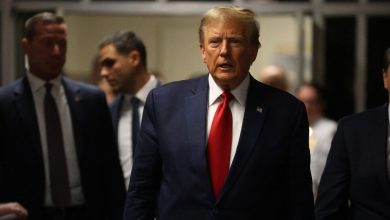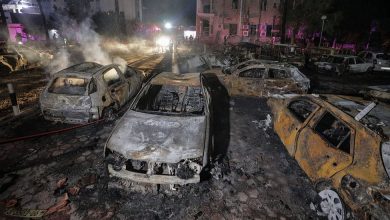Israel Summit Shows Ties With Arabs Moving From Ceremony to Substance

JERUSALEM — Israel’s meeting with top diplomats from four Arab countries and the United States, set to start on Sunday, is one of the strongest signs yet that the country is beginning to reap the dividends of normalization deals reached two years ago, a profound realignment of Middle Eastern powers that has been accelerated by the war in Ukraine.
The deals have also prompted Egypt, a longtime peace partner, to engage more meaningfully with Israel as Cairo tries to revive its role as Israel’s bridge to the Arab world. When Israel first announced the summit on Friday, Egypt was not on the list of countries attending — the United Arab Emirates, Morocco and Bahrain. But it was added on Saturday.
The groundbreaking meeting — the first involving so many Arab, American and Israeli officials on Israeli soil at once — is evidence of Israel’s acceptance by key Arab leaders, said Abdulkhaleq Abdulla, an Emirati political scientist. It does not mean that these countries consider Israel their leader, he added, but it suggests that the relationship between the United States and its Middle East partners is about to enter a new phase.
“This is a way to show that American friends, American partners, are speaking to America collectively, rather than individually,” he said. “Maybe that way, Washington will listen to us more on key issues.”
Most Arab countries have yet to formalize relations with Israel, and polls suggest that many people in the Arab world do not support normalizing ties with Israel. But to Gulf leaders, the cost of disappointing the Arab street is outweighed by the benefits of sending a strong message to both to their longtime benefactor, the U.S., and their shared enemy, Iran.
When Israel sealed diplomatic agreements in 2020 with several Arab countries that had long avoided formal ties, questions remained about how functional, how sustainable and how meaningful those deals would be. Even last month, when Naftali Bennett became the first Israeli prime minister to visit Bahrain, he acknowledged that relations still needed to evolve “from ceremonies to substance.”
The meeting in Negev desert town of Sde Boker on Sunday and Monday will almost certainly be heavy on spectacle and symbolism. But it is also unquestionably the substance Israel that has been hoping for.
Though the U.S. helped Israel broker the deals with the U.A.E., Morocco and Bahrain, it is Israel that can now act more publicly as a conduit between Washington and some Arab countries.
The meeting will provide a forum to discuss both disagreements and shared concerns about Ukraine and will give Mr. Blinken a chance to encourage Washington’s Middle East allies to align with American efforts to isolate Russia.
By hosting, Israel will bring together Secretary of State Antony J. Blinken with his Emirati counterpart, Abdullah bin Zayed Al Nahyan, at a time of friction between their countries over Russia’s invasion of Ukraine. The U.A.E. has so far dodged American demands to increase its oil production in order to help American allies find alternatives to Russian gas.
Israel — though praised by Washington for mediating between Russia and Ukraine — has also avoided imposing sanctions on Russia or condemning it too harshly. And Morocco, which relies on grain supplies from Russia and Ukraine and is facing a growing economic crisis, has also resisted American expectations to condemn the invasion.
Isolated for years by most of the Arab world, Israel is now working in tandem with Arab governments that have some common interests in the fallout from the war in Ukraine as well as a shared interest in containing Iran.
The foreign ministers will meet as American-backed efforts to secure a new nuclear deal with Iran reach a climax. The meeting will offer participants the chance to express concerns to Mr. Blinken about aspects of the proposed deal that they deem too lenient on Iran, and to encourage a distracted Washington to play a more active role in the region.
To be sure, Israel has long been a global player, dominant in the worlds of technology, cybersurveillance, military equipment, as well as a canny diplomatic operator long before the normalization process was finalized in 2020. It has historically been seen as a back channel to Washington, and clandestine relations between Israeli and Gulf officials began several years before they were announced in 2020.
But Israel’s ability to function as a public, high-profile broker between other countries — instead of mainly maintaining only its own bilateral ties, or passing quiet messages to Washington — feels new.
Not only has Israel demonstrably become a bridge between some Arab countries and the U.S., but Mr. Bennett has emerged as a mediator between Russia and Ukraine, even flying to Moscow this month to speak directly with Vladimir V. Putin, the Russian president.
“It’s a pretty amazing turnaround, frankly,” said Michael Koplow, policy director at the Israel Policy Forum, a U.S.-based research group.
“We’re used to thinking of Israel as being obviously a regional military power, and I think it’s probably accurate to say that Israel is also a global cyberpower,” he added. “But I think that Bennett is doing everything he can to try to portray Israel as a critical diplomatic power as well, including in areas where you wouldn’t necessarily think of Israel playing in the past — such as a war in Europe.”
For Gulf countries “going to Israel makes perfect sense,” said Elham Fakhro, a Bahraini political analyst.
“The optics of sending a message about a new security alliance, pushing the relationship with Israel out in the open and then sending a message to Iran, and in a way to the U.S. — that is the main priority,” she added. “It takes precedence over any kind of domestic issue.”
In any case, Ms. Fakhro said, “They’ve found that there isn’t much of a price to pay domestically.”
The involvement of the Egyptian foreign minister also speaks to how far Israel has come in shedding its regional isolation. Until 2020, Egypt was for decades one of only two Arab countries, along with Jordan, that had made peace agreements with Israel. But it is now relegated to more of a supporting act.
Mr. Bennett and several of his ministers have visited the U.A.E. and Bahrain — something that was once considered unthinkable — and some ministers have also gone to Morocco. Mr. Bennett met this week in Sharm el Sheikh with both Mohammed bin Zayed, the Emirati crown prince, and the Egyptian president, Abdel Fattah el-Sisi — another gathering that would have been highly unlikely two years ago.
Perhaps more substantively, the Israeli Defense Ministry has also signed memorandums of understanding with their Bahraini and Moroccan counterparts, making it easier for the three countries to trade military equipment and for their armies to coordinate.
Russia-Ukraine War: Key Developments
Biden in Europe. President Biden, who is wrapping up his diplomatic trip to Europe, met with Polish and Ukrainian officials as well as Ukrainian refugees who have fled to Poland. He is scheduled to deliver concluding remarks later today.
On the ground. Ukraine’s counteroffensive appeared to be gaining momentum, with the military hitting Russian targets and claiming territorial gains. Their progress underscores Russia’s flawed execution of the invasion, with supply shortages and demoralizing conditions for its soldiers.
Russia signals a shift. Russia’s Defense Ministry said the goals of the “first stage of the operation” had been “mainly accomplished,” and that it would now focus on securing Ukraine’s eastern Donbas region. The ambiguous statement could signal a possible recalibration of its war aims.
Weapons of mass destruction. Dmitri A. Medvedev, the vice chairman of Russia’s Security Council, said the country was prepared to use nuclear weapons if its existence was threatened. NATO allies earlier agreed to provide Ukraine with equipment and training to deal with fallout from a possible Russian attack using chemical, biological or nuclear weapons.
Trade between Israel and the U.A.E. ballooned in 2021 to about $1 billion, roughly 20 times as much as in 2020, according to estimates by business leaders.
Israel and other countries in the region are also working to formalize a communication system that will allow each partner to warn one another in real time about incoming drones from Iran and its proxies, according to a senior Israeli defense official.
“There is a lot of substance to this — it’s not just symbolism,” Mr. Abdulla said. “The substance has to do with security coordination, political coordination and other things that can follow as a result.”
As American attention diverts elsewhere, Arab leaders have realized that Israel is a long-term partner, both economically and in the fight against Iran, said Yoel Guzansky, a former Israeli official and an expert on the Gulf at the Institute for National Security Studies, an Israeli research group.
“Israel is here to stay,” he said.
Almost absent from the conversation are the Palestinians, whose fate, it seems increasingly clear, is now of less immediate importance to key Arab governments than the threat of Iran and the opportunity of better trade and military ties with Israel.
The decision to hold the meeting in the Negev, rather than in Jerusalem, reflects how the status of the city is nevertheless still a highly delicate issue for Arab leaders. Palestinians still hope the eastern portion of Jerusalem will one day become the capital of a sovereign Palestinian state, while Israel says the entire city is its eternal and indivisible capital.
To attend a summit in Jerusalem would be construed as a tacit blessing for the Israeli narrative, and therefore a bridge too far for any Arab minister.
And the ministers are still expected to quietly discuss the possibility of a new surge of violence in Israel and the occupied territories next month. In April, there will be a rare overlap of three key religious holidays — Ramadan, Passover and Easter — a convergence that is expected to heighten tensions between Israelis and Palestinians.
But publicly, no participant in the meeting has yet spoken about the Palestinians in the buildup to the summit. The entire normalization process remains a huge disappointment to Palestinians, said Ghassan Khatib, a Ramallah-based political analyst and former Palestinian minister.
“The Arabs, by doing this, are following delusions, and they’re not going to serving their cause or our cause,” Mr. Khatib said. “But there’s little we can do.”
Lara Jakes contributed reporting from Warsaw, and Carol Sutherland from Moshav Ben Ami, Israel.





